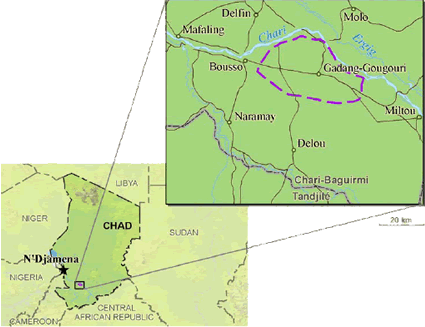The Gadang people live in southern Chad near the Cameroon border. The Gadang speak their own language of Gadang. There are currently no resources available in the Gandang language. A tiny fraction of the Gadang claim to be followers of Christ.
They make their living by agriculture. The savannah region where the Gadang live is subject to periodic draughts. If the rains fail to come, the Gadang can face starvation. Life is hard for the Gadang. They work from sunup to sundown in their fields of millet, maize, sorghum, beans and peanuts. Many of their children do not attend school but must work with their families. Few villages have schools. The Gadang tend to marry within their group. Marriage to one spouse is the norm although a man may have up to four wives if he can afford them. Elders rule the Gadang villages making judicial decisions and dealing with outsiders. Families arrange marriages with girls marrying young. Parents have many children. Many children do not live to the age of ten due to the lack of access to modern medicine. Some Gadang have moved to cities seeking a better life. They must take menial jobs due to their lack of skills and literacy.
The majority of the Gadang profess to be Sunni Muslims. Their Islam is mixed with folk religion and animism. A sizable portion of the Gadang still practice the pre-Islamic belief in evil spirits who can bring harm if they are not appeased. Sunnis try to obey the teachings of the Koran and the prophet Muhammad. Sunnis believe that by following the Five Pillars of Islam that they will attain heaven when they die. However, Allah, the supreme God of the universe, determines who enters paradise. Sunnis pray five times a day facing Mecca. They fast the month of Ramadan. They attend mosque services on Friday. If a Muslim has the means, he or she will make a pilgrimage to Mecca once in his or her lifetime. Muslims are also prohibited from drinking alcohol, eating pork, gambling, stealing, using deceit, slandering, and making idols. The two main holidays for Sunni Muslims are Eid al Fitr, the breaking of the monthly fast and Eid al Adha, the celebration of Abraham's willingness to sacrifice his son to Allah.
The Gadang have huge physical and spiritual needs. One of their biggest needs is not having local sources of clean water. Most villages do not have electricity or schools for their children. Most of all, the Gadang must hear and respond to the good news about Jesus Christ. He alone can forgive their sins and grant them eternal life.
Pray that the Lord sends workers to share the gospel with the Gadang. Pray that Gadang parents are able to provide for their children. Pray that Christian resources will be translated into the Gadang language. Pray that teachers come to teach the Gadang adults and children to help them learn how to read and write. Ask the Lord to raise up a church planting movement among the Gadang.
Scripture Prayers for the Gadang in Chad.
https://en.wikipedia.org/wiki/Gadang_language
| Profile Source: Joshua Project |











